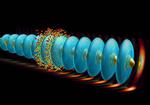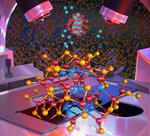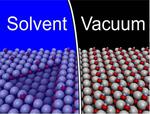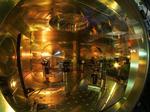Other
“Scientists at the Max Planck Institute for Polymer Research (MPI-P) in Mainz (Germany) together with scientists from Dresden, Leipzig, Sofia (Bulgaria) and Madrid (Spain) have now developed and characterized a novel, metal-organic material which displays electrical properties mimicking those …

“Data storage devices are not improving as fast as scientists would like. Faster and more compact memory storage devices will become a reality when physicists gain precise control of the spins of electrons. They typically rely on ultra-short lasers to …

“Researchers are documenting the different temperature and proton dosages required to make defects that will further allow silicon carbide to be used for quantum technology. Silicon carbide (SiC), a material known for its toughness with applications from abrasives to car …

“First successful test of the particle accelerators of the future There is a good chance that soon a new door will open to physicists, offering them new insights into the mysteries of the universe. The international AWAKE collaboration has made …

“New artificial materials for semiconductors used in solar cells or photoelectrochemical cells that are designed from scratch with totally new and tailored properties: this is the latest research topic of Stefan Wippermann, head of the group “Atomistic Modelling“ at the …

“Physicists at the Laboratory for Attosecond Physics, which is jointly run by Ludwig-Maximilians-Universität and the Max Planck Institute of Quantum Optics, have developed a high-power laser system that generates ultrashort pulses of light covering a large share of the mid-infrared …

“In an article that appears in the journal “Review of Modern Physics”, researchers at the Laboratory for Attosecond Physics (LAP) assess the current state of the field of ultrafast physics and consider its implications for future technologies. Physicists can now …

“Scientists at the Max Planck Institute for Polymer Research in Mainz, Germany, have received an unexpected result: They have discovered a new method to improve contacts in OLEDs. This new approach leads to a higher energy efficiency and can be …

“Scientists at the Max-Planck-Institut für Eisenforschung show how geometric structures at surfaces can be formed with atomic precision by water A central element in such diverse technological problems as corrosion protection, battery materials or hydrogen production via electrolysis or fuel …

“Many chemical processes run so fast that they are only roughly understood. To clarify these processes, a team from the Technical University of Munich (TUM) has now developed a methodology with a resolution of quintillionths of a second. The new …
